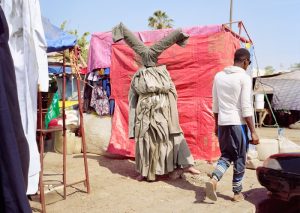Second part of my review (part 1 focused on the exhibition) of Transnationalisms, a group show and symposium curated by James Bridle at Aksioma in Ljubljana.
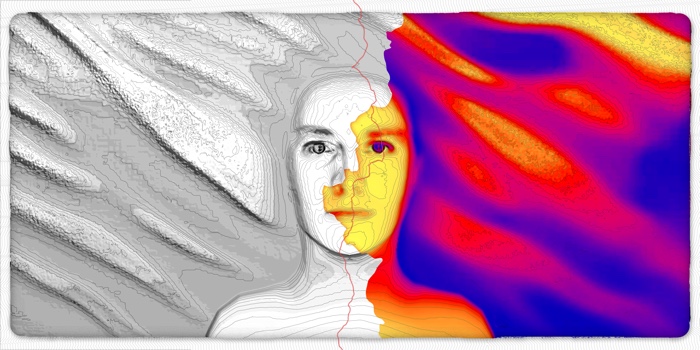
The event attempted to re-frame the discussions around borders, looking at how borders are strengthened, shuffled and blurred by global phenomena such as climate disruptions, planetary-scale computation and international politics.
Transnationalisms adopted a broad view of what border can mean:
Not merely the border between physical zones and between nation states, with their differing legal jurisdictions and requirements for entry and residency, but also the border between the physical and digital, when we apparently – but perhaps misleadingly and certainly temporarily – cross over into a different zone of possibility and expression.
Transnationalisms was part of Tactics&Practice, a series of seminars organized by Aksioma to reflect on some of the issues explored by new media arts today. This was a particularly successful edition. Maybe that’s because we’re in Slovenia, a country whose size and history places it naturally at the crossroads of languages and cultures. Or maybe it’s because this particular issue of transnationalism is in everyone’s mind these days, maybe we’re all wondering how geography, nationhood and our own sense of belonging are being affected by sea rises and melting snow peaks. Maybe some of us are tempted to believe newspapers headlines that prognosticate the collapse of our civilization if Europe opens its borders to people who have been forced to leave their land because of war, disasters or again, the effects of climate change.
Each of the speaker brought his or her very own perspective on the connections between borders, bodies and technology. What they all seemed to agree on though is that there’s nothing rational, natural nor sacrosanct about nations and borders.
Aksioma uploaded most of the talks on its vimeo channel. I’ve summed up below each video the notes i took at the event. But please ignore my notes and just press play:
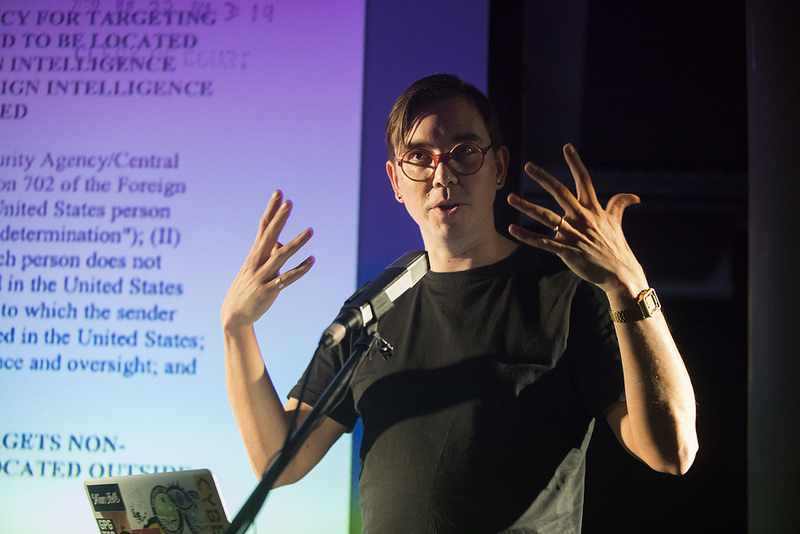
James Bridle at the Transnationalisms. Bodies, Borders, and Technology conference in Kino Šiška, Ljubljana. Photo: Miha Fras / Aksioma
James Bridle: The Real Name Game. Video: Aksioma
James Bridle, who curated Transnationalisms, explained what drove him to look into the issue. It all started with a document that came out as part of the Snowden leaks. This one: Procedures Used by the National Security Agency for Targeting Non-United States Persons Reasonably Believed to be Located Outside the United States to Acquire Foreign Intelligence Information Pursuant to Section 702 of the Foreign Intelligence Surveillance Act of 1978, as Amended.
The document suggests that since the NSA is not supposed to spy on American citizens, they have to find a way to determine who the information they gathered from the internet belongs to: a U.S. or a non-U.S. citizen? Their strategy consists in observing the websites an individual visits, if at least 50% of the data browsed is American, they leave that person alone. If the percentage falls below 50, then it’s fair game to spy on that person. That’s what Bridle calls your Algorithmic Citizenship, a type of citizenship decided by the data that you leave behind.
The reason why knowing your algorithmic citizenship matters is that each of us has the fundamental right to privacy. That right not to be the object of surveillance depends on your citizenship. Only your own government will protect those rights. The leaked document, however, reveals that the rights to privacy can also be determined by a piece of software, not just by your passport.
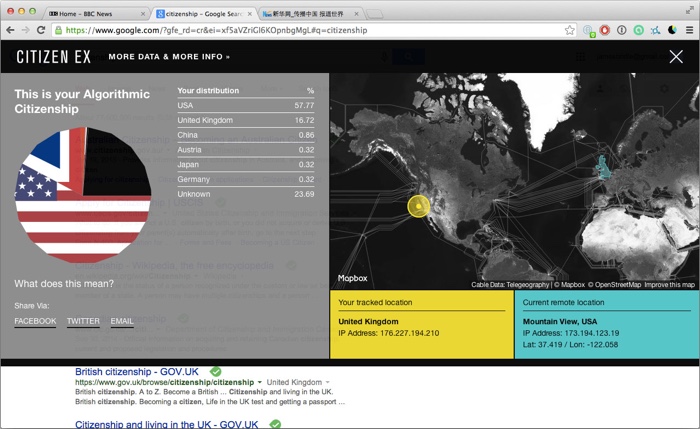
James Bridle, Citizen Ex, 2015
In 2015, Bridle launched Citizen Ex, a software that tracks your browsing privately and shows where the websites you’re visiting actually are. Over time, the software build up your algorithmic citizenship. The other reason why you should check out Citizen Ex is that it makes visible the physical locations of data. Most of us have no idea where our data is going or where the websites we visit are located. If we don’t know that, we don’t know where nor how our identity is being constructed. The metaphor of ‘the cloud’ contributes to this ignorance by blurring any perception we might otherwise build of communication networks.
Bridle also looks at other cases in which digital technology has changed perceptions of citizenship, national politics and identities: Estonia backing up its own country (or at least its notoriously digitized governmental services and data) in an e-embassy, a small area of a data center in Luxembourg; a group of young people in Macedonia running a ‘fake news machine’ that might or might not have influenced the results of the 2016 U.S. presidential election; Tamil people making up fake names for themselves so that Facebook won’t reject them, etc.
His research into transnationalism shows how much technological systems can shape reality.
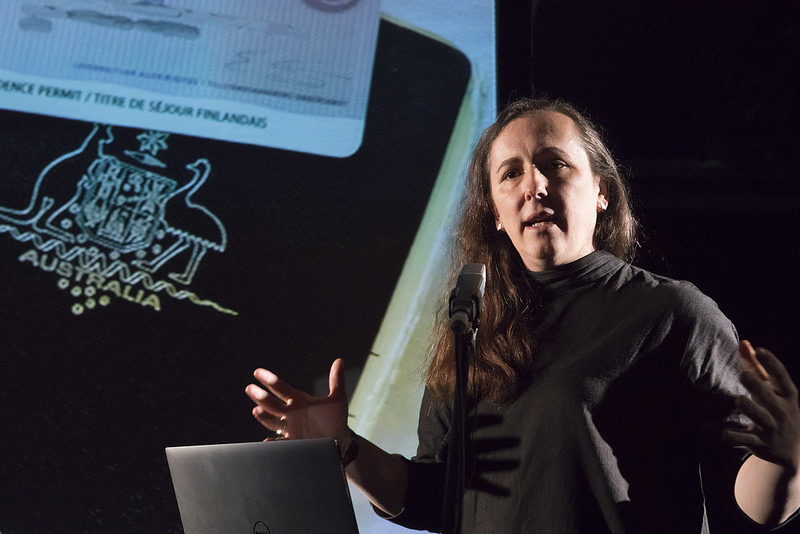
Eleanor Saitta at the Transnationalisms. Bodies, Borders, and Technology conference in Kino Šiška, Ljubljana. Photo: Miha Fras / Aksioma
Eleanor Saitta, Performing States. Video: Aksioma
Eleanor Saitta, a hacker (and thus expert in systems and security), designer, artist, and writer started with a very personal take on transnationalisms but quickly moved to questioning our construct of nation.
Her talk addressed the speed at which the meaning of border is changing. That meaning is evolving so rapidly that physical borders are becoming irrelevant and that the infrastructures that make nations are becoming useless. Technology is driving some of these changes of course but climate change is also increasingly challenging the way we relate and understand nations. She believes that if we want to survive climate change as a species, supply chain and infrastructures have to work for the planet and thus need to be conceived up in terms of global -not national- scope.
“Let’s think in deeper time,” Saitta concluded. “We live in a transient moment of total nations, this will pass. An important thing we should do now is figure out how to prehearse an understanding of what it means to exist beyond the total nation.”
She also mentioned a couple of books. One was The Art of Not Being Governed by political scientist and anthropologist James C.Scott. It sounded promising, i’ve just downloaded the first chapter.
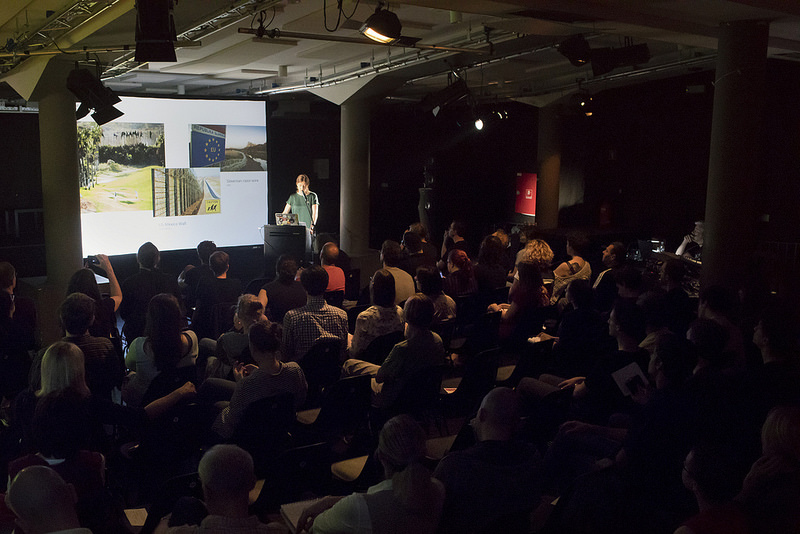
Mojca Pajnik at the Transnationalisms. Bodies, Borders, and Technology conference in Kino Šiška, Ljubljana. Photo: Miha Fras / Aksioma
Mojca Pajnik, Reclaiming Humanity – The utopias of world citizenship. Video: Aksioma
Mojca Pajnik, a researcher, professor at the University of Ljubljana and an expert in issues of citizenship, migration regimes, racism, gender (in)equality and media looks at transnationalisms under a more political lens. Her talk analyzed the European discourse on immigration: the way it is presented (a sabotage of sovereignty!), handled (by externalizing borders, making sure that countries like Morocco, Libya or Turkey keep refugees in tents so they stay further away from Europe) and how these strategies dehumanize human beings looking for a better life.
Reclaiming humanity against “the globalization of indifference” requires a utopian invention of “worldliness of people” that stands for a political project of equality, rather than the moral project of the defence of traditions.
Peng Collective, Hacking politics with subversion, civil disobedience and law. Video: Aksioma
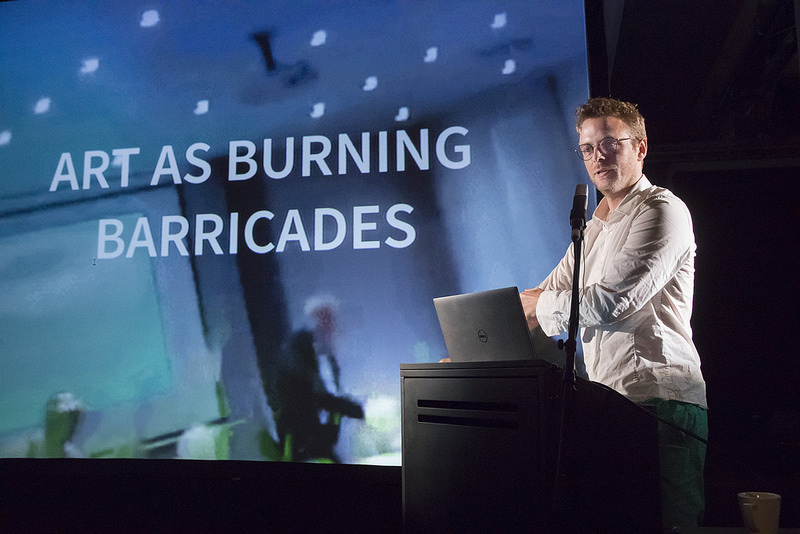
Jean Peters (The Peng! Collective) at the Transnationalisms. Bodies, Borders, and Technology conference in Kino Šiška, Ljubljana. Photo: Miha Fras / Aksioma
Jean Peters is researching new tactics and strategies for campaigning and political change. He’s part of The Peng! Collective, a group of culture jamming activists who are incredibly cunning, fun and efficient when it comes to launching campaigns that involve throwing pies at members of the German far right-wing party, denouncing the global weapon industry, allowing citizens to call up agents of the secret services, helping refugees cross the EU borders safely, etc.
His talk was energizing. Unfortunately, it hasn’t been uploaded on vimeo but as soon as it’s there i’ll 1. update this post and 2. let you know about it on twitter.
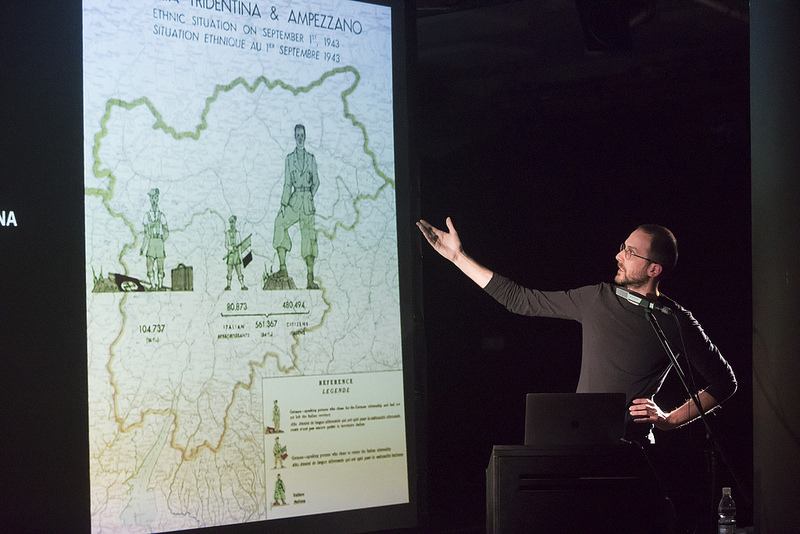
Marco Ferrari at the Transnationalisms. Bodies, Borders, and Technology conference in Kino Šiška, Ljubljana. Photo: Miha Fras / Aksioma
Marco Ferrari (Studio Folder), Italian Limes: Mapping the Shifting Border across Alpine Glaciers. Video: Aksioma
Marco Ferrari from Studio Folder illustrated the research that preceded Italian Limes. The installation makes visible the effects that climate change is having on Alpine glaciers and, as a consequence, on the re-drawing of the national borders between Italy and its neighbouring countries.
His talk took us to the archives of the Military Geographic Institute (IGM) in Florence where Studio Folder explored how national borders have been understood, surveyed and measured throughout the history of Italy. From books containing seemingly endless lists of coordinates, to the use of late-19th century photogrammetry technology, to maps. But the most significant change is that the Apline glaciers, which constitute the ‘natural’ borders between Italy, France, Switzerland and Austria are melting. The natural frontier is literally evaporating and the old maps are not valid anymore. A few years ago, the Italian government decided to define its almost 2,000 km long border as a “shifting border”.
Italian Limes makes this problem visible thanks to the small units that the team have installed at the frontier with Austria. The devices are equipped with sensors that measure the temperature, pressure and other data that the installation then shares with the public.
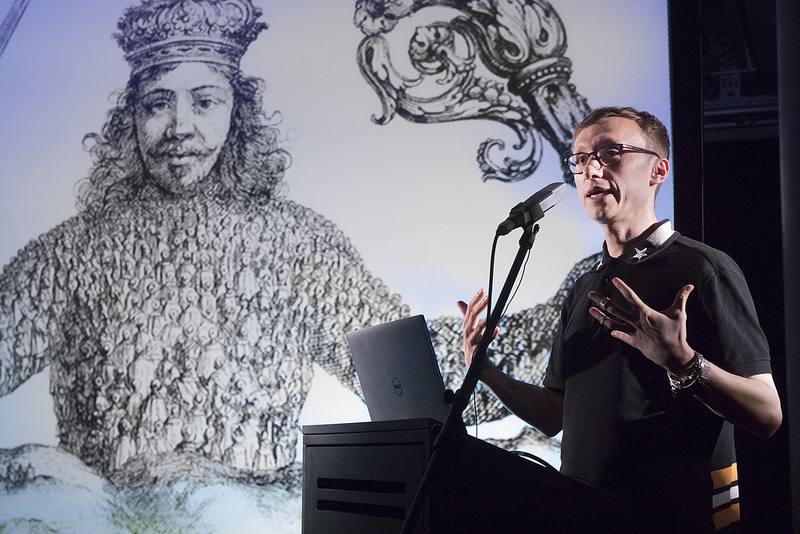
Denis Maksimov at the Transnationalisms. Bodies, Borders, and Technology conference in Kino Šiška, Ljubljana. Photo: Miha Fras / Aksioma
Denis Maksimov, steɪt əv nəʊlænd [State of Noland]: on potent futures post- sovereignty, nationalism & imperialism. Video: Aksioma
Denis Maksimov, a theorist, independent curator and co-director of the Avenir Institute, took Leviathan, the book published by Thomas Hobbes in 1651, as the starting point of his reflection. He invited us to consider the nature, history and future of the nation state through a redrawing of the giant figure of the sovereign appearing on the frontispiece of Leviathan. He replaced one by one the constituents of the nation state with concepts that would enable the emergence of an alternative ideology for political self-organisation: steɪt əv nəʊlænd [State of Noland].
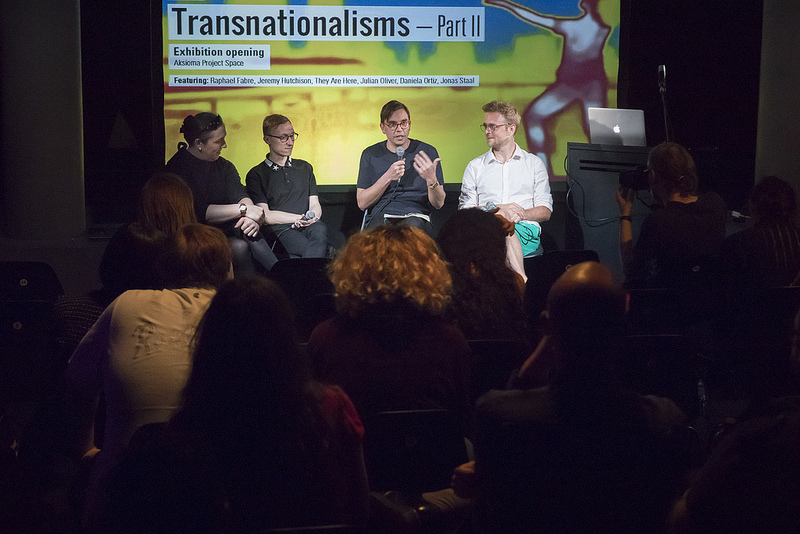
Transnationalisms. Bodies, Borders, and Technology conference in Kino Šiška, Ljubljana. Photo: Miha Fras / Aksioma
The exhibition Transnationalisms – Bodies, Borders, and Technology, curated by James Bridle, remains open at Aksioma Project Space in Ljubljana and at the Museum of Contemporary Art Metelkova until 25 May 2018.
This program is realized in the framework of State Machines, a joint project by Aksioma (SI), Drugo more (HR), Furtherfield (UK), Institute of Network Cultures (NL) and NeMe (CY).
Previously: Transnationalisms – Bodies, Borders, and Technology. Part 1. The exhibition.
Image on the homepage: Italian Limes by Studio Folder.



